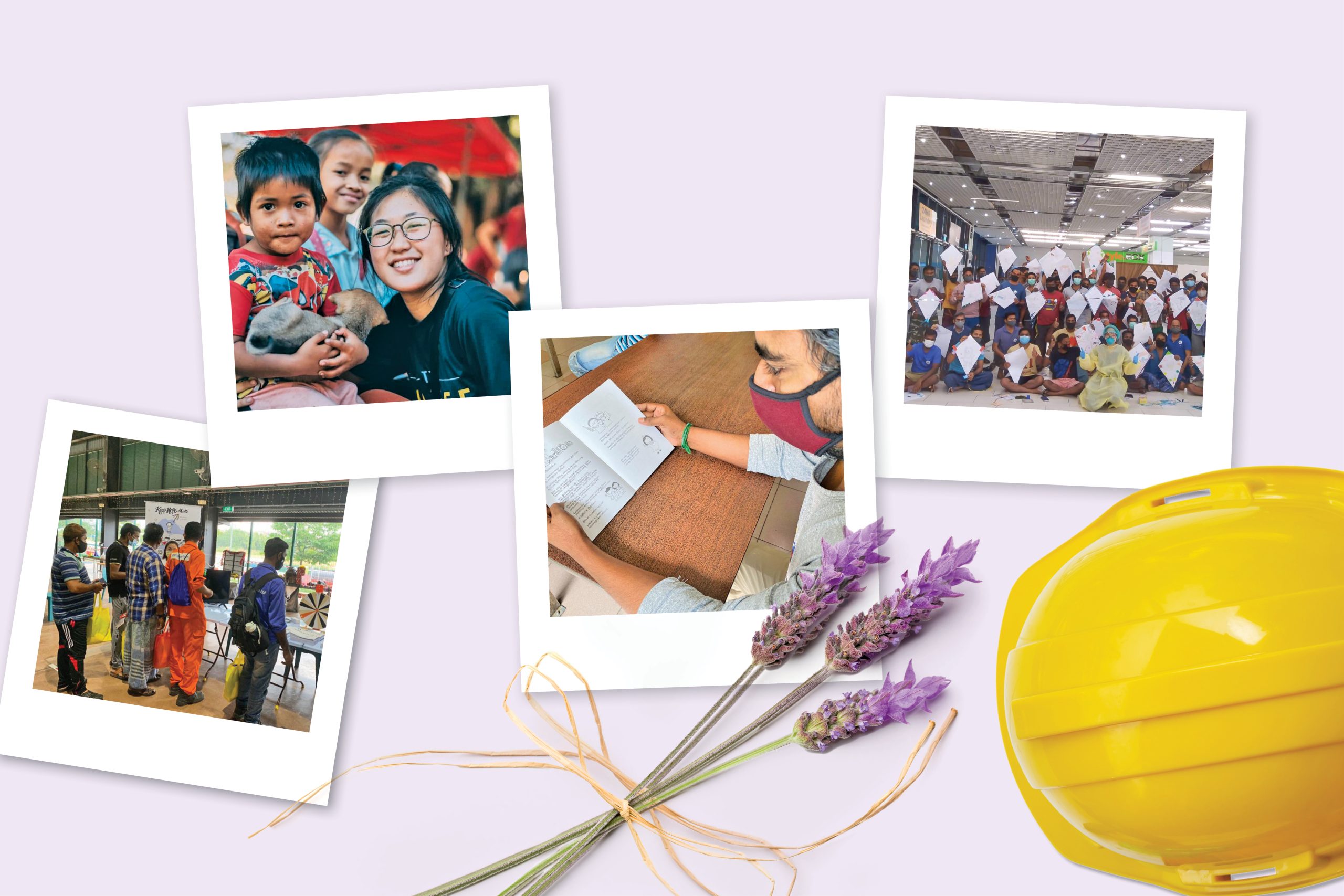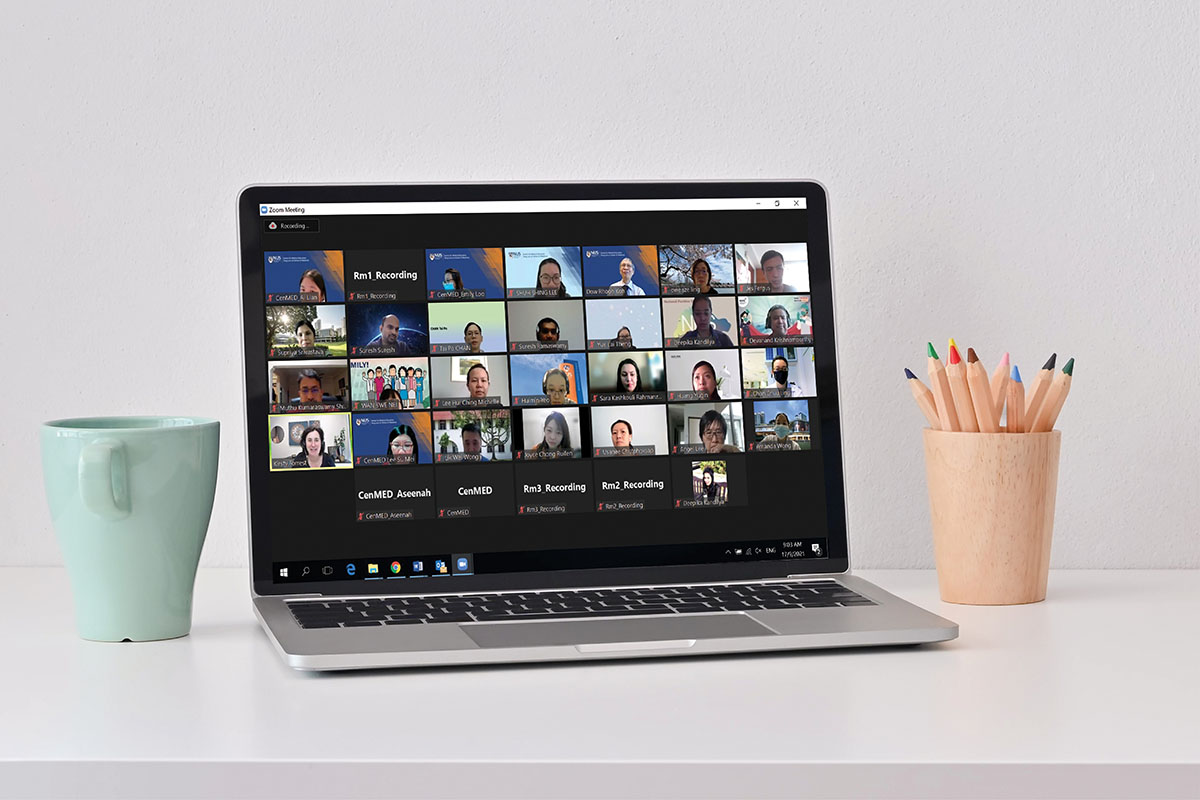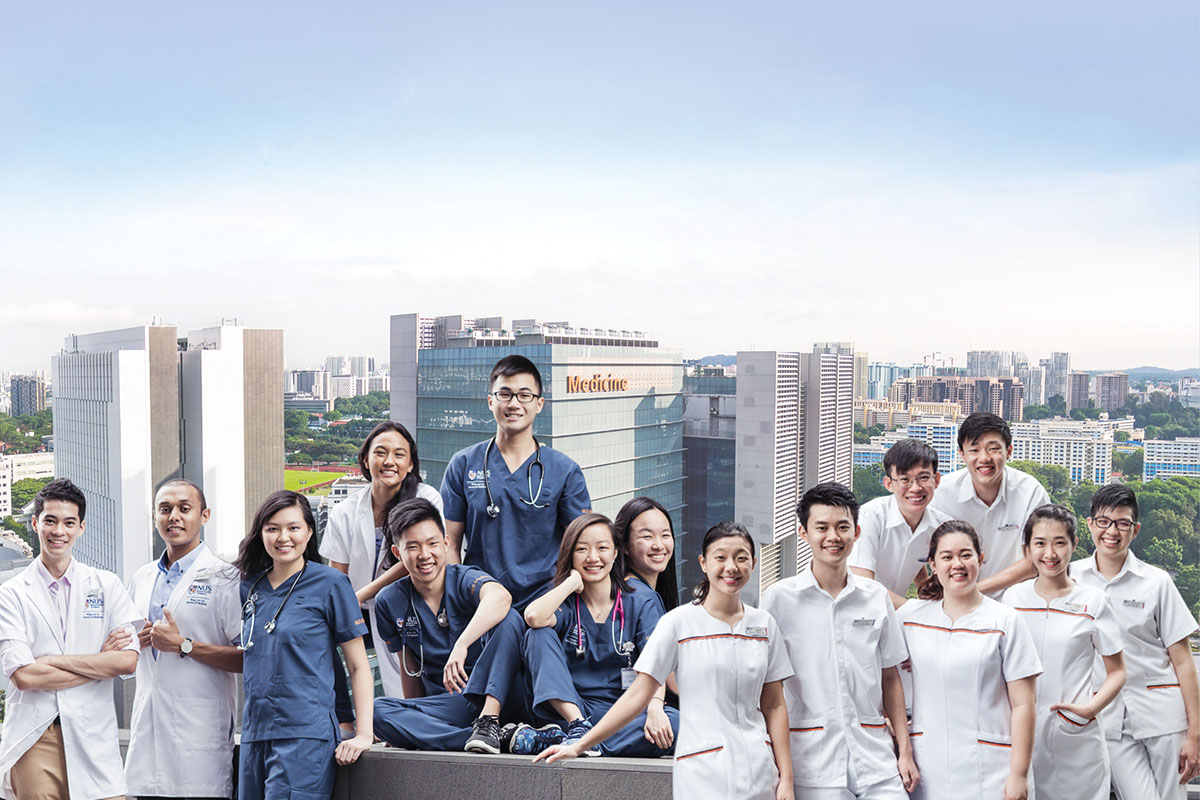
Issue 41 / February 2022
Alumni Voices
A Conversation with Marianne
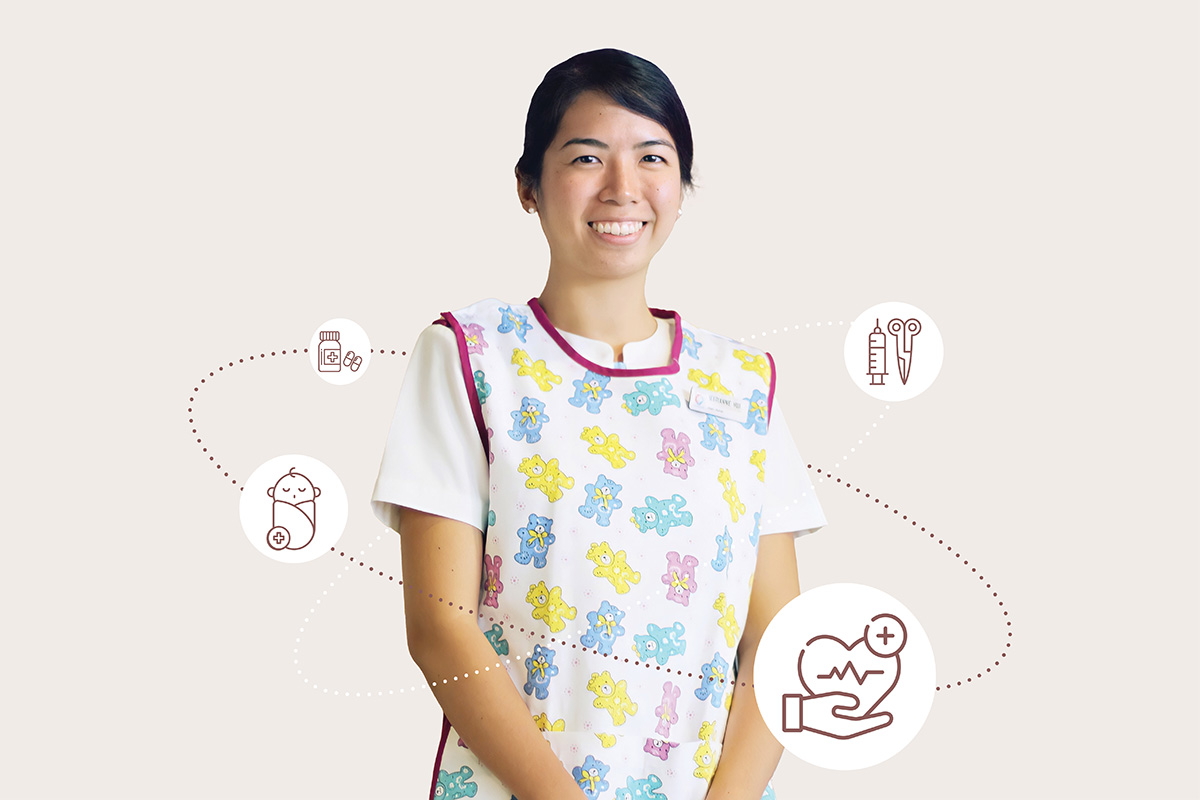
Nursing alumna Marianne Hui (Class of 2014) found her calling in meeting with and tending to the sick and the hurting, in and out of hospitals and the society at large. Nursing, she says, is journeying with people in need and that is something she looks forward to doing wherever she finds herself.
Q: In your junior college years, did you think about what you would like to do in terms of a career or vocation? Did the practice of Medicine come to mind? Did you follow up on your choice of studies and what happened thereafter?
A: When I was in junior college, I really enjoyed studying chemistry. I also had a great teacher, and so I considered becoming a chemistry teacher, but I was never really convinced that that was what I was supposed to be. Honestly, I really didn’t know what I wanted to be then, and neither did most of my classmates. It was difficult to make a lifelong decision when the only experience we had was in school.
The practice of Medicine only really became a consideration for me after I got my A-Level results, with which I’d be able to apply for the course. Prior to that, I’d thought about being a doctor, but never gave it much thought as I didn’t think I’d qualify. Besides Medicine, I began considering other professions in healthcare, which I thought would also be meaningful and fulfilling. There was quite a lot of pressure, in the form of support and encouragement, for me to apply for Medicine, and so I did. Apparently, it would have been a waste of my grades and talent otherwise.
Q: You wanted to spend a gap year in Africa. What spurred you to want to do this, and why Africa? What did you learn in your time there? Did that year away change you and in what ways?
A: Nearing the end of my junior college studies, I attended a Christian conference about various humanitarian work that was going on around the world. It greatly inspired me, and I longed to be able to be a part of such an impactful work. For years, I had been praying for and giving financial aid to a group of vulnerable people in Africa, and thought this would be the perfect opportunity to see and serve them in person. My dad also knew of some mission programmes in Africa that would be suitable for me to be a part of, so to Africa I went! I ended up taking a gap year and postponing my university education.
Many people said I would be missing out and falling behind, but actually, I learnt so much in Africa—that I could never have learnt in school. With dire poverty right before me, my grades and academic achievements which had previously defined me faded in importance. At the age of 18, it was my first time meeting and befriending homeless people, trafficked women, street kids, abandoned babies… and the city girl in me realised how sheltered I had been in Singapore, and that the world was very different. To care for others well, I needed to grow in my character and faith—which, by God’s grace, I did.
At the end of my year in Africa, I didn’t want to come home. I had changed so much and grown to love the people I was serving. I no longer wanted to chase my own prestige, as I’d done all my life. I had learnt to trust God, whose plan for me was evidently the best, way better than any life I could have planned for myself. And so, coming home, I knew that one day I would return to missions, and not just for a year, but for life. Everything else in between would prepare me for that.
Q: You eventually decided to enrol in a Nursing degree at NUS. What led you to this decision?
A: In Africa, I met many people with great needs, and I often wasn’t able to help in a tangible way, besides providing a listening ear and praying for them. I wished I had more skills with which I could add value to their lives—whether providing health education, or doing something as simple as dressing their wounds. Nevertheless, as I listened to their stories and tried to encourage them in their lives, I realised that I very much enjoyed journeying with people, serving them in whatever capacity I could, and being a part of their lives.
This was ultimately what made me decide to study Nursing. I wanted to be able to journey with people, to be there for their highs and lows, and to be able to provide healing, support, and encouragement on their road to recovery, no matter how long or short.
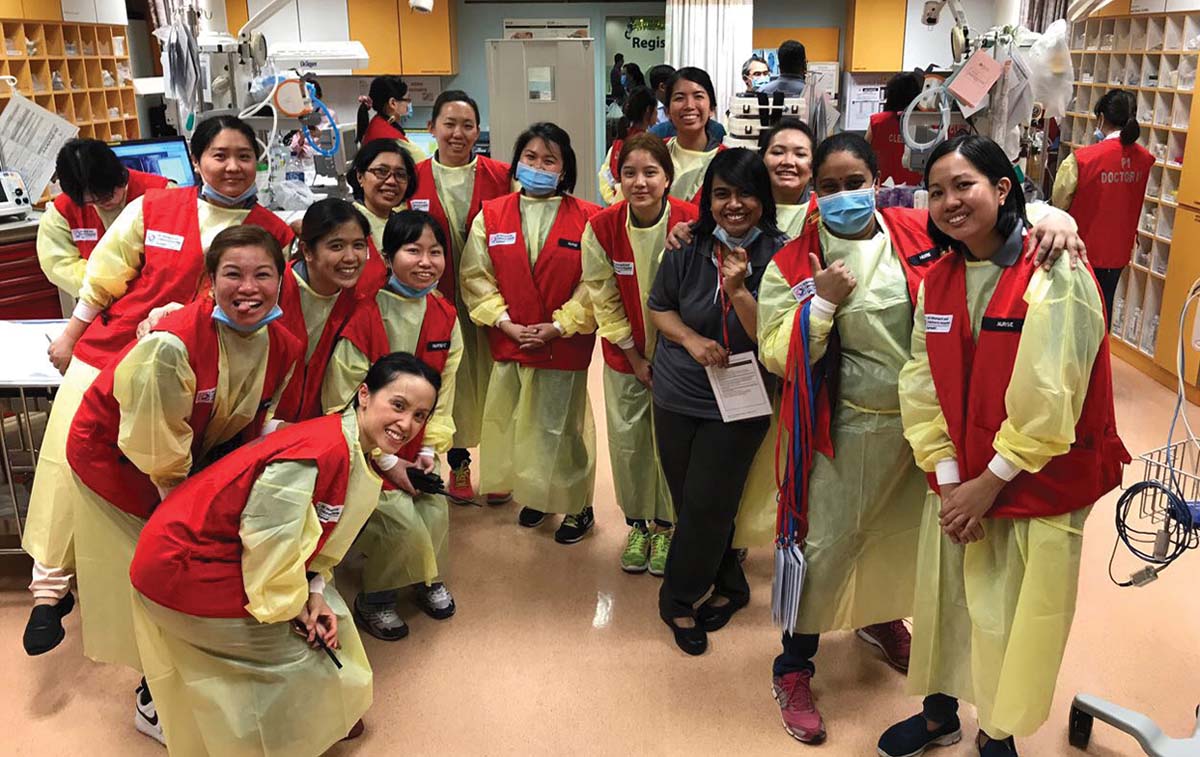
Marianne with her fellow nurses. (Photo taken before COVID-19).
Q: How did you find your years at NUS Nursing and when did you graduate? Do you recall any memorable experiences during your student days that helped to affirm your choice of studies?
A: I thoroughly enjoyed my three years at NUS Nursing before graduating in 2014. Learning to be a nurse was stimulating and challenging, and I marvelled at how our bodies were created to function. I particularly enjoyed each skills lab, where we got to learn and practise nursing skills on dummies or on each other. Of course, the camaraderie between all my fellow nurses-to-be was what made studying so enjoyable and meaningful too!
There were definitely moments of self-doubt when I was a student. Attachments to various hospital wards were not always easy, and I sometimes wondered if I was cut out for the job. I’m thankful that with every struggle, God used it to grow me as a nurse.
While I was doing my Obstetrics and Gynaecology attachment, one of the women under my care had just had a miscarriage. She was resting in the ward, and as I took her vital signs, she started weeping uncontrollably. I didn’t know how to respond, so I quickly ran off to look for tissue paper. By the time I came back, a nurse was comforting her, and in that moment… I felt like a failure. Why did I not even know how to comfort someone who was hurting?
When I reflected on this incident with my clinical Instructor, she didn’t put me down, but rather affirmed my efforts for wanting to offer practical help by getting a tissue for the lady. Her kind words encouraged me when I doubted myself, enabled me to learn from the experience rather than be defeated by it, and she is only one of many who kept me going in my journey as a nurse.
“My education equipped me with the knowledge I needed to do my job well, but as paediatric emergency is a very niche field, much of my training was on-the-job too! For that reason, I am really thankful that I had tremendously supportive bosses and helpful colleagues who showed me the ropes and taught me what I needed to know to function efficiently in a fast-paced and dynamic environment.”
Q: What is it about the nursing profession that you think would set it apart from other work?
A: As a Christian, I believe that all work is important and meaningful, and should be done with pride and excellence! As a nurse, that takes the form of being knowledgeable about our patients and their conditions, being compassionate towards those who are hurting, and being capable in the tasks we need to perform. This is no easy feat in a strained hospital system, burdened with the additional weight of a pandemic. But because we give of ourselves so much in Nursing, there is also much room for personal growth—growing in perseverance, patience, grit, tenacity and strength, even as we serve and work in humility. It truly is a privilege!
Q: Where did you work after you graduated in 2014? What were your roles and responsibilities; did you find your Nursing education and training adequate in equipping you with the necessary skills and knowledge to do your job well?
A: Upon graduation, I worked as a staff nurse in KK Women’s and Children’s Hospital’s (KKH) Children’s Emergency (CE), caring for children under observation, administering medical tests and interventions, and also assisting in procedures such as suturing of lacerations and manipulation and reduction of fractures, among other responsibilities. For the most part, my education equipped me with the knowledge I needed to do my job well, but as paediatric emergency is a very niche field, much of my training was on-the-job too! For that reason, I am really thankful that I had tremendously supportive bosses and helpful colleagues who showed me the ropes and taught me what I needed to know to function efficiently in a fast-paced and dynamic environment.
As I became more experienced in my work, I started documenting resuscitations and was put in charge of the nurses on shift, and then after attending my department’s core programme, was equipped to triage patients and play an active part in resuscitations.
Q: Were there special experiences at work, with patients, co-workers etc, that stand out in your memory?
A: There were great highs and also deep lows in my experience at the CE. One of the highs was when an infant was brought in without a pulse, and after a period of intense resuscitation, he cried! I almost cried at that moment too—never had I been so happy to hear a baby cry.
Another special experience was when I was triaging an infant one day. His toddler brother was asking many questions about what I was doing, and he was really adorable and curious, so I explained what I was doing while I assessed his little brother. With my clinical judgment, I also ordered a minor procedure at triage that eventually saved the parents hours of waiting later. I didn’t think much of it, but a few weeks later, my manager showed me an email that the parents had sent to KKH, commending me for my kindness to their older son and my acumen that ultimately made their experience at the CE smoother.
One last experience that I will always remember was the night when we had two simultaneous Code Blues. The night shift had just taken over, and the afternoon shift was on the way out of the department when the alert was called. Instead of heading home, half of the afternoon shift stayed way beyond their working hours to help resuscitate the two children, who BOTH eventually walked out of KKH, well and whole! The camaraderie that was displayed that night among my colleagues, and on many other occasions, gave me strength to carry on fighting even when the job got really difficult.
Q: What lies ahead for you, what are you looking forward to in your Nursing journey?
A: I’m actually currently not practising nursing! As I’d mentioned earlier, I studied nursing to have a skill that I could use in missions. My family is preparing to move to another country for this purpose, but I am unlikely to work as a nurse there. Nevertheless, I know that the skills I’ve picked up as a nurse will enable me to serve others better in missions on an everyday basis, and I look forward to it!

